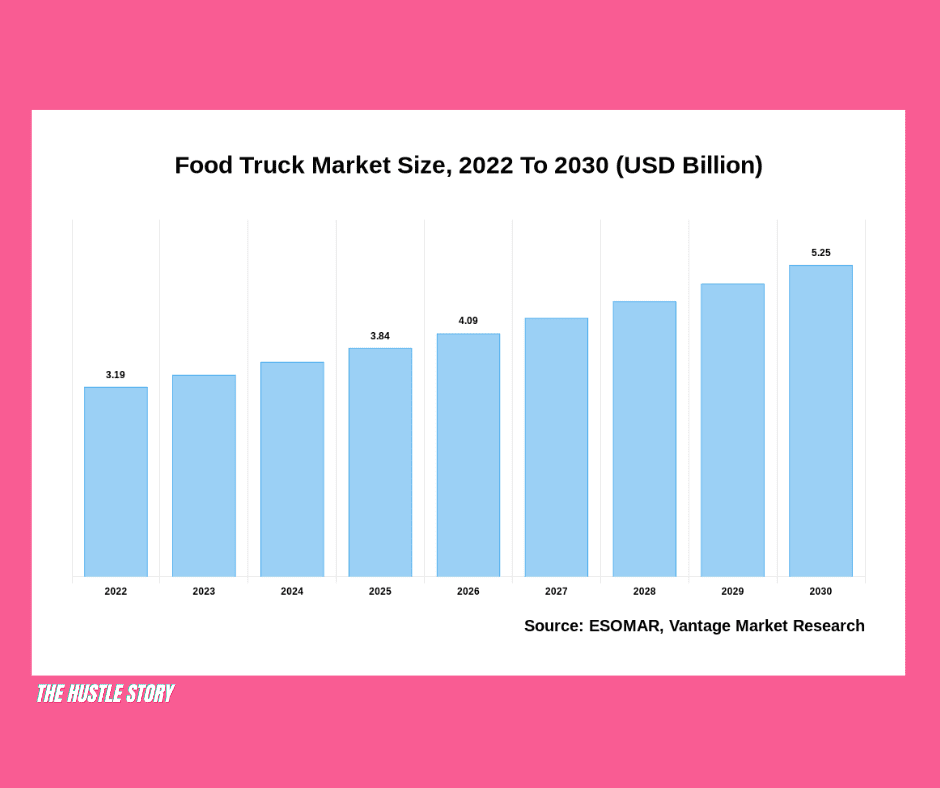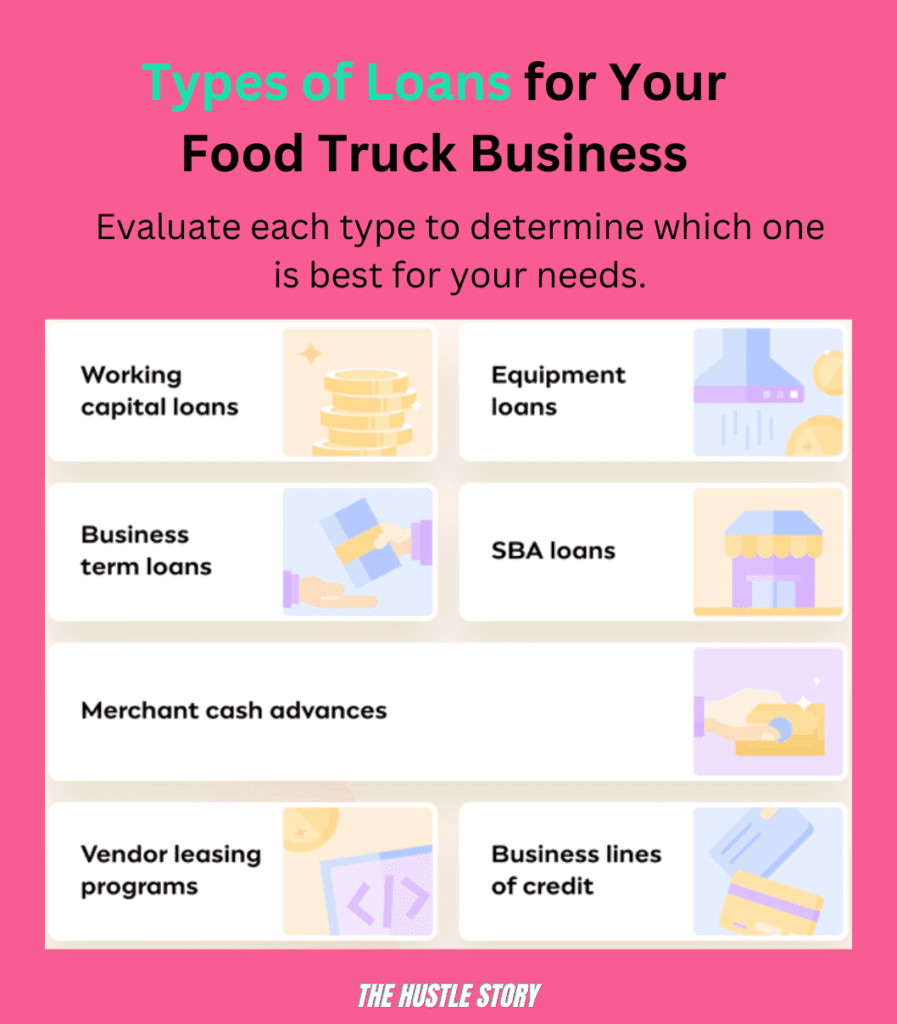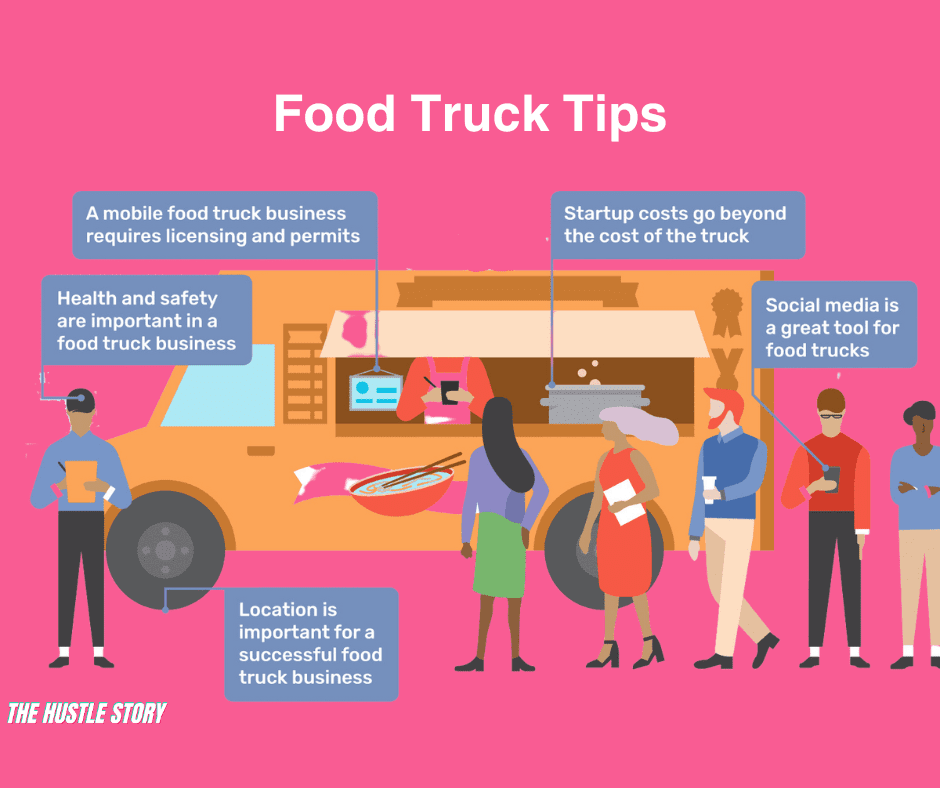Are you looking to turn your culinary passion into a thriving business? Discovering how to start a food truck business could be your recipe for success.
From crafting a unique concept to navigating permits and sourcing equipment, embarking on this flavorful journey requires careful planning. In this guide, we’ll delve into the essential steps on how to start a food truck business and the cheapest way to build it.
So, let’s dive into the exciting world of food trucks and uncover the key ingredients for a successful startup!
Why Food Truck Is A Good Business?
Who doesn’t like to do an exciting and rewarding job like the food truck business? But many of us wonder whether it’s a good business or not. Should we start it or not?
And that’s why I’m here to help you out!
As someone who has experienced the joy and success of running a food truck in my early twenties, I can confidently say it is an exceptional business opportunity. Let me share why I believe this to be true – Why food truck is a good business?

1. Lower Startup Costs
Starting a food truck business usually involves less capital and operating expenses than creating a conventional physical restaurant. You don’t need to worry about leasing an ample space or investing in extensive interior design.
2. Flexibility and Mobility
Food trucks offer the advantage of mobility. You can take your business to different locations and events, allowing you to target other customer bases and maximize your exposure.
This flexibility can also help you adapt to changing market trends and customer preferences.
3. Market Testing
Food trucks provide a great platform to test your culinary concepts and menu items before committing to a more significant restaurant venture. You can gauge customer reactions and adjust your offerings accordingly.
4. Niche and Unique Offerings
Food trucks often specialize in a specific cuisine or a unique food concept. This niche approach can help you stand out and attract a dedicated customer base looking for something different.
5. Engagement and Interaction
Direct interaction with customers at a food truck can create a more personal and engaging dining experience. Building a customer rapport can lead to loyal followers who become repeat patrons.
6. Event Opportunities
Food trucks are often invited to participate in various events, festivals, and fairs, providing exposure to large crowds who are already in a festive mood and more willing to try new foods.
Owning and managing a food truck is an incredibly rewarding and profitable venture.
The flexibility, lower costs, creativity, direct customer interaction, and the growing demand for street food make it an excellent choice for aspiring entrepreneurs like you and me.
How To Start A Food Truck Business?
If you’re as passionate about food as I am and you’ve dreamt of serving up your culinary creations on the streets, starting a food truck business might be the perfect venture for you.

As someone who has recently taken the plunge into this exciting world, let me walk you through the steps I’ve taken to turn my passion into a successful food truck business.
So let’s explore the crucial steps on how to start a food truck business.
Step 1. Define Your Concept
Defining your culinary concept is the first and arguably most crucial step in starting a food truck business.
What sets you apart from the rest? Do you specialize in meatless protein, healthy salads, harm burgers, ethnic cuisine, or decadent desserts?
Identifying a unique selling point (USP) is vital to standing out in a saturated market. Conduct thorough market research to understand local food preferences, trends, and competition.
This insight will help you shape a concept that resonates with your target audience.
Step 2. Research and Planning
A successful food truck business requires meticulous planning. Begin by drafting a detailed business plan that outlines your concept, target market, menu, pricing strategy, and financial projections.
Determine your startup costs, including the truck purchase or lease, equipment, permits, licenses, and initial ingredient inventory.
A detailed financial plan, including startup costs, operational expenses, and revenue projections, attracts potential investors or lenders and will help you secure funding and navigate the financial aspects of your business.
Step 3. Legalities and Permits
Operating a food truck involves navigating a lot of legalities and permits.
Depending on your location, you’ll need to obtain various licenses, such as business, health department, and parking permits.
Compliance with local, state, and federal regulations is non-negotiable, as food safety and sanitation are top priorities in the industry. Engage with legal and regulatory experts to ensure your business operates within the boundaries of the law.
Step 4. Choosing The Right Vehicle
Selecting the perfect food truck is akin to choosing the canvas for your culinary masterpiece. Consider factors such as size, layout, and kitchen equipment.
Will you opt for a retrofitted van, a classic step van, or a custom-built truck?
Collaborate with a skilled designer and contractor to create a functional workspace that optimizes efficiency and safety.
Step 5. Equipping Your Mobile Kitchen
Equipping your food truck kitchen with the right tools is essential for delivering high-quality dishes efficiently.
Invest in top-notch kitchen appliances, including grills, fryers, refrigerators, and food prep stations. Maximizing space utilization is crucial, so plan your kitchen layout meticulously. Also, prioritize energy-efficient equipment to minimize operating costs.
Step 6. Create A Menu
Your menu is the heart and soul of your food truck business.
Create a menu that highlights your culinary skills and attracts your target market. Balance variety and simplicity, offering a selection of signature dishes that can be prepared quickly without compromising quality.
Consider dietary trends and preferences, offering vegetarian, vegan, or gluten-free options to cater to a diverse customer base.
Step 7. Marketing and Branding
Establishing a strong brand presence is crucial if you want to draw customers to your food truck. Develop an eye-catching logo, vibrant truck wrap, and catchy tagline that reflects your culinary identity.
Leverage social media platforms to create anticipation before your launch, sharing tantalizing food photos and behind-the-scenes glimpses of your culinary journey.
Engage with your audience, respond to comments, and create online promotions to generate buzz.
Step 8. Find Prime Locations
Location can make or break a food truck’s success. Look for areas with high foot traffic, such as business centers, shopping malls, universities, and major event spots.
Collaborate with local businesses to secure parking spaces during lunch hours or special events. Consistency in location and schedule will help you build a loyal customer base.
Step 9. Delivering Exceptional Customer Service
Outstanding customer service is the secret ingredient that keeps customers coming back for seconds.
Train your team to provide friendly and efficient service, fostering a positive and memorable experience for every customer. Personalized interactions, attention to detail, and a willingness to accommodate special requests will set your food truck apart.
Step 10. Adapting and Innovating
The food industry is ever-evolving, and successful food truck businesses stay ahead of the curve by embracing change.
Stay open to customer feedback, adapt your menu to seasonal ingredients, and experiment with new dishes to keep the culinary experience fresh and exciting. Consider catering events, partnering with local businesses, or even launching a mobile app to facilitate orders and updates.
Starting my food truck business has been incredible, full of challenges, triumphs, and exciting moments.
If you’re passionate about food and eager to share your dream with the world, follow these steps on how to start a food truck business as your guide.
Food Truck Startup Cost
Starting a food truck business comes with its fair share of costs, and I’m happy to share my experience with you.

When I first delved into the world of food trucks, I knew that budgeting was vital. Here’s a breakdown of the startup costs I encountered:
- Purchase of used food truck: $50,000. (If you are going for a new one, you can expect to spend anywhere from $75,000 to $150,000)
- Customization and Equipment: $18,000. Turned the truck into a fully functional kitchen with the necessary cooking equipment, storage, and plumbing.
- Licenses and Permits: $3,000. Remember that these expenses may vary based on your region and the local regulations.
- Initial Ingredients and Supplies: Stocking ingredients and supplies to kickstart my menu costs $3,500. This cost will also fluctuate depending on the complexity of your dishes and your menu size.
- Branding and Design: $1,700
- Marketing and Promotion: $1,000 for online promotion, flyers, and business cards.
- Working Capital: I set aside about $5,000 to cover ongoing expenses like fuel, additional ingredients, and unexpected costs.
So, my total startup cost came to approximately $82,200. It’s worth noting that costs can vary widely based on your location, the type of cuisine you’re offering, and the extent of customization you choose for your food truck.
While the initial investment might seem substantial, the rewards of running a successful food truck business can be even greater.
How Much Does It Cost To Run A Food Truck Monthly?
Running a food truck business has been an incredible journey, and managing the monthly costs has been a vital part of the adventure.
On average, my monthly expenses for the food truck operations fall in the range of $4,000 to $6,000.
This covers a variety of essential expenditures that keep the business up and running.
One of the significant costs is the food and ingredients, which usually account for around $1,500 to $2,500 per month, depending on the menu’s complexity and customer demand.
Fuel and maintenance for the truck come to about $500 to $700 monthly, ensuring we’re always mobile and ready to serve. Additional operational costs like staff wages, which vary based on the number of employees, can add another $1,000 to $2,000.
Of course, there are also ongoing expenses for marketing, permits, and licenses, amounting to around $300 to $500 monthly.
Cheapest Way To Build A Food Truck
As you have decided to start your food truck business, let me tell you the cheapest way to build a food truck for your business.

After researching and learning from experienced food truck owners, I discovered these valuable tips to keep costs down while creating a functional and appealing mobile kitchen.
1. Start With A Used Truck
Opt for a pre-owned truck in good condition rather than investing in a brand-new one. Look for reliable options through online marketplaces, classified ads, or auctions. Make sure the truck’s engine and chassis are in good shape to avoid significant repair costs.
2. Simplify Customizations
Focus on functional rather than extravagant customizations. Design a layout that maximizes workspace efficiency and minimizes construction costs.
Basic design changes like painting the interior and adding simple shelving can give your truck a fresh look without breaking the bank.
3. Purchase Pre-Owned Equipment
Equip your food truck with pre-owned kitchen appliances and utensils.
Search for restaurant supply stores, online marketplaces, or local auctions for gently used equipment that’s still in good working condition. This approach can save a substantial amount compared to buying brand-new equipment.
4. DIY Interior Work
If you’re skilled, consider doing some of the interior work yourself. Paint the walls, install basic shelving units, and make minor modifications to keep costs low. Just ensure that any DIY work adheres to health and safety standards.
5. Prioritize Essential Equipment
Only invest in the essential cooking equipment and tools you need to run your menu efficiently. Avoid unnecessary gadgets or appliances that might increase costs without adding significant value to your offerings.
6. Simple Branding
While branding is necessary, opt for a straightforward and cost-effective approach. Design a clean and memorable logo that you can easily incorporate into signage, menus, and online presence.
Focus on building a strong online presence through social media to attract customers without spending much.
7. Negotiate With Suppliers
When purchasing equipment or supplies, negotiate with suppliers for better deals. Some suppliers might offer discounts, especially if you’re buying in bulk.
Combining these techniques will allow you to establish an affordable, high-quality food truck on a tight budget. Starting small and focusing on the essentials will allow you to bring your culinary vision to life while staying within your financial means.
How Much Is A Used Food Truck Cost?
Wondering how much a used food truck costs? Let me explain it to you.
The cost of a used food truck can vary based on several factors, including the truck’s age, condition, size, equipment, and location.

On average, a used food truck can range from $20,000 to $100,000. Here’s a breakdown of what you might expect to find in different price ranges:
- $20,000 – $40,000: You’ll likely find older models with higher mileage in this lower price range. These trucks require more maintenance and some repairs. However, with careful inspection and some refurbishing, you could still get a functional food truck at a relatively affordable price.
- $40,000 – $70,000: This mid-range price bracket often includes trucks that are in better condition and may have been well-maintained. You can expect to find various options with moderate mileage and a range of equipment. You might even find a truck that’s been lightly used and well-equipped.
- $70,000 and above. In this higher price range, you’ll likely come across newer models and trucks that have undergone significant customization and upgrades. These trucks might have state-of-the-art kitchen appliances, high-quality materials, and modern designs. This range could be a good fit if you’re looking for a turnkey solution requiring less renovation.
It is crucial to remember that the price of the used food truck is just one part of the equation. You’ll also need to consider additional costs for customization, repairs, equipment upgrades, permits, licenses, and other operational expenses.
When shopping for a used food truck, thoroughly inspect the vehicle’s condition, including the engine, chassis, and any equipment that comes with it. To find the best deal, consider looking at online marketplaces, classified ads, auctions, and local dealerships.
It’s also a good idea to consult with other food truck owners and industry experts to better understand current market prices and what to look for in a used food truck.
What Licenses Are Needed To Start A Food Truck?
I have already mentioned in Step 3 of how to start a food truck business about the legalities and permits required to start a food truck business.
But, in this section, I will explain in detail all the licenses I needed to kickstart my food truck business, which is also essential for many food truck owners.

- Business License: This basic license allows you to operate a business in your area legally. You will get it from your local city or county government.
- Mobile Food Vendor License: This license permits you to operate a mobile food business like a food truck. The requirements and application process can vary by jurisdiction.
- Health Department Permit: This permit ensures your food truck meets health and safety regulations. You’ll likely need to undergo inspections of your food preparation area, equipment, and hygiene practices.
- Food Handler’s Permit: Many jurisdictions require individuals handling food to have a food handler’s permit. This usually involves taking a short course on safe food handling practices.
- Seller’s Permit: Also known as a sales tax permit or resale permit, it allows you to collect and remit sales tax on the food and beverages you sell.
- Parking and Zoning Permits: Depending on where you plan to park your food truck, you might need permits related to parking or zoning. Some areas have designated zones for mobile vendors, while others might require special permits for operating in specific locations.
- Fire Department Permit: Fire safety regulations may require you to obtain a permit to ensure your food truck meets fire safety standards.
- Signage Permit: If your food truck has signage, such as a logo or menu, you might need a signage permit to display it.
- Special Event Permits: If you plan to participate in special events, festivals, or farmers’ markets, you may need additional permits specific to those events.
- Alcohol Permit (if applicable): If you plan to serve alcoholic beverages, you’ll need the appropriate permits to do so legally.
It’s vital to keep in mind that these criteria can differ significantly depending on your location, so it’s crucial to learn about the laws that apply in your state.
Conclusion
In wrapping up this guide on how to start a food truck business, it’s clear that this venture is a blend of passion, strategy, and determination.
By mastering the art of crafting a unique menu, securing necessary licenses, and effectively marketing your mobile culinary haven, you’re well-equipped to navigate the exciting challenges ahead.
As you roll onto the bustling streets, remember that a well-prepared food truck business has the potential to not only satisfy taste buds but also become a recipe for entrepreneurial success.
FAQs
1. How do I choose the right location for my food truck?
Selecting the ideal location is crucial for success. Research high-traffic areas, office districts, college campuses, and events to gauge customer footfall. Consider local regulations, parking availability, and competitor proximity to make an informed decision.
2. What licenses and permits do I need to operate a food truck legally?
You’ll likely need a business license, mobile food vendor license, health department permit, food handler’s permit, and parking and zoning permits. Consult your local government agencies to understand the specific requirements in your area.
3. How can I create a unique menu for my food truck business?
Craft a menu that showcases your culinary strengths and appeals to your target audience. Balance familiar favorites with unique signature dishes. Consider dietary trends and cultural influences while keeping ingredients and preparation costs in mind. Regularly update your menu to keep customers intrigued and engaged.
4. Is social media important for a food truck business?
Absolutely! Social media is a powerful tool for promoting your food truck’s location menu specials and engaging with customers. Establish a solid online presence to keep hungry patrons informed and excited about your offerings.



![21 Worst Shark Tank Failures And Why They Failed? [2024] 10 Shark Tank Failures](https://thehustlestory.com/wp-content/uploads/2021/11/Shark-Tank-Fails-Blog-Banner-2.jpg)


